Objectives
Regarding its support for sciences, the focus on the foundation is on life sciences. The Schering Foundation supports projects in particular in the fields of biological, medical or chemical basic research as well as the exchange and dialogue between science and society. Through the annual Ernst Schering Prize, the foundation honors distinguished scientists. Special attention is also given to young scientists, supported through stipends to study or attend training in Germany.
On the occasion of its 10th anniversary in 2012, the foundation awarded its first Friedmund Neumann Award for young scientists who achieved major breakthroughs in basic research in biology, chemistry or medicine.
Regarding its support for arts, the focus of the Schering Foundation's activities is on contemporary fine and performing arts, including dance and music. In its own exhibition venue in Berlin-Mitte, the foundation presents international contemporary artists with projects that are often developed specifically for this venue. Each year, the foundation awards together with the KW Institute for Contemporary Art in Berlin the Kunstpreis der Schering Stiftung (art award of the Schering foundation) honoring international emerging artists in fine arts.

Christiane (Janni) Nüsslein-Volhard is a German developmental biologist and 1995 Nobel Prize-winner.
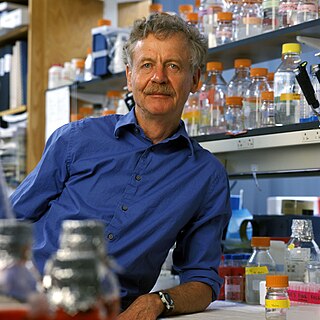
Rudolf Jaenisch is a Professor of Biology at MIT and a founding member of the Whitehead Institute for Biomedical Research. He is a pioneer of transgenic science, in which an animal’s genetic makeup is altered. Jaenisch has focused on creating genetically modified mice to study cancer and neurological diseases.
Sir Michael John Berridge was a British physiologist and biochemist.
Simon Asher Levin is an American ecologist and the James S. McDonnell Distinguished University Professor in Ecology and Evolutionary Biology and the director of the Center for BioComplexity at Princeton University. He specializes in using mathematical modeling and empirical studies in the understanding of macroscopic patterns of ecosystems and biological diversities.
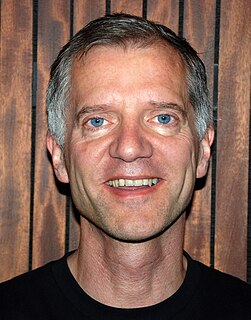
Matthias Mann is a scientist in the area of mass spectrometry and proteomics.
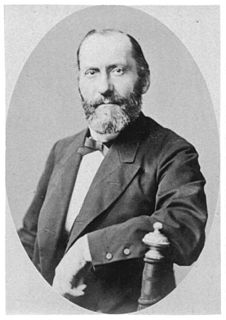
Ernst Christian Friedrich Schering was a German apothecary and industrialist who created the Schering Corporation. The company split into Schering AG and Schering-Plough after US assets were seized during World War II.
Ernst Albrecht von Siemens was a German industrialist.
Bert W. O’Malley is the Tom Thompson Distinguished Service Professor of Molecular and Cellular Biology and Chancellor at Baylor College of Medicine. A native of Pittsburgh, he has a bachelor's degree from the University of Pittsburgh and a M.D. from their School of Medicine (1963). He completed his residency at Duke University and spent four years at the National Institute of Health followed by four years serving as the Luscious Birch Professor and the director of the Reproductive Biology Center at Vanderbilt University. He then moved to Baylor as Professor and Chairman of Molecular and Cellular Biology.
Franz-Ulrich Hartl is a German biochemist and Managing Director of the Max Planck Institute of Biochemistry. He is known for his pioneering work in the field of protein-mediated protein folding and is a recipient of the 2011 Lasker Award along with Arthur L. Horwich.
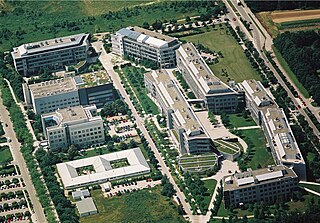
The Center for Integrated Protein Science Munich (CIPSM) is a cluster of excellence in sciences located in Munich. It is an association of research groups of the Ludwig Maximilian University of Munich, the Technical University of Munich, the Helmholtz Center Munich, and the Max Planck Institutes of biochemistry and neurobiology in Martinsried. Research at the center expands from isolated proteins up to proteins in living organisms applying methods of biophysics, biochemistry, medicine, and biology.
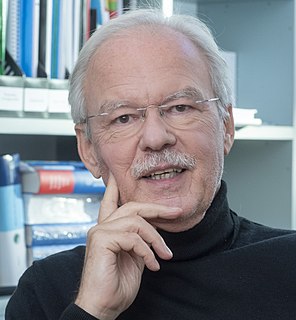
Stefan Hugo Ernst Kaufmann is a German immunologist and microbiologist and is one of the highly cited immunologists worldwide for the decade 1990 to 2000. He is amongst the 0.01% most cited scientists of ca. 7 million scientists in 22 major scientific fields globally.
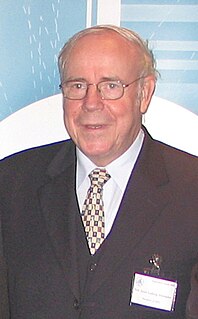
Ernst-Ludwig Winnacker is a German geneticist, biochemist and research manager. His main fields of research are virus/cell interaction, the mechanisms of gene expression in higher cells and prion diseases. He was President of the German Research Foundation and Secretary General of the European Research Council and is Secretary General of the Human Frontier Science Program Organization.

Mary Miss is an American artist and designer. Her work has crossed boundaries between architecture, landscape architecture, engineering and urban design. Her installations are collaborative in nature: she has worked with scientists, historians, designers, and public administrators. She is primarily interested in how to engage the public in decoding their surrounding environment.

The Ernst Schering Prize is awarded annually by the Ernst Schering Foundation for especially outstanding basic research in the fields of medicine, biology or chemistry anywhere in the world. Established in 1991 by the Ernst Schering Research Foundation, and named after the German apothecary and industrialist, Ernst Christian Friedrich Schering, who founded the Schering Corporation, the prize is now worth €50,000.
Maureen Connor is an American artist who creates installations and videos dealing with human resources and social justice. She is known internationally for her work from the 1980s to the present, which focuses on gender and its modes of representation.

Georg Heinrich Hermann Henneberg was a German physician, who served as President of the Robert Koch Institute from 1952 to 1969 and as President of the Federal Health Agency from 1969 to 1974. He was previously director of the Department of Bacteriology at the pharmaceutical company Schering AG.

Pinar Yoldas is a Turkish-American architect, artist and professor at University of California San Diego. She is known for art and architecture that focus on the anthropocene, futurism, and feminist technoscience.
Elly Margaret Tanaka is a biochemist and senior scientist at the Research Institute of Molecular Pathology (IMP) in Vienna, Austria. Tanaka studies the molecular cell biology of limb and spinal cord regeneration as well as the evolution of regeneration.
An Ecosystem of Excess is an art project by artist and researcher Pinar Yoldas. The project addresses a series of ecological problems such as man-made extreme environments, consumer capitalism, plastic pollution and threatened species in the age of the Anthropocene. Yoldas was awarded the Ernst Schering Foundation Arts & Culture Grant for her project, and An Ecosystem of Excess was premiered in Ernst Schering Project Space in Berlin in 2014.
Renata Lucas is a Brazilian artist.
This page is based on this
Wikipedia article Text is available under the
CC BY-SA 4.0 license; additional terms may apply.
Images, videos and audio are available under their respective licenses.










